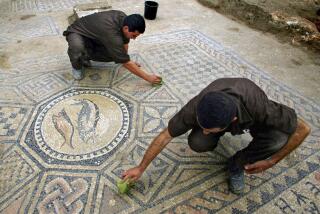Greeks Want Marbles Back by 2004 Games
- Share via
SALT LAKE CITY — The Greek government, intent on taking full advantage of the unparalleled publicity platform the Olympic Games offers, on Thursday renewed its long-standing claim for the British Museum to return to Greece one of the world’s most valuable art prizes, the Parthenon Marbles.
Culture Minister Evangelos Venizelos, in an interview with The Times, maintained that the series of sculptures and friezes “are not independent archeological items but part of a single immobile building, the main symbol of western civilization,” and said they ought to be returned to Greece, as a long-term loan, in time for the 2004 Summer Games.
“It is not a claim of the Greek people or the Greek government against the United Kingdom, but a necessity of the monument itself,” Venizelos said.
The marbles consist of 56 blocks of friezes and 19 statues. The dispute over their proper place is so fierce that there is even argument over what they ought to be called. The British don’t call them the Parthenon Marbles; they call them the Elgin Marbles, after the earl who brought them to London some 200 years ago.
For centuries before that, the marbles had graced the Acropolis, the hill in downtown Athens on which the Parthenon sits.
For decades now, the Greeks have pressed for the return of what they believe to be one of the central icons of their national culture.
The British, meantime, have said they own the marbles, and that’s that. The marbles are without question one of the British Museum’s primary attractions.
The idea for the long-term loan first surfaced last May, in a letter from Venizelos to the British government. He reiterated the proposal Thursday and plans to make it again in the next few days with reporters from around the world.
He said here Thursday that the “new material element” in the campaign is a museum dedicated to the antiquities of the Acropolis that the Greeks hope to have built and operational by the opening of the Summer Games on Aug. 13, 2004.
The cornerstone of the museum is due to be laid this year. It would be built on the south side of the Acropolis, and plans call for a dramatic glass structure that would afford fantastic views of the hill.
The loan, as described by Venizelos, actually would amount to a kind of trade. Greek officials stand prepared to offer the British Museum their pick from collections in Greece of thousands of statues and vases dating 2,500 years; they also are offering to post an engraved sign in the new Acropolis museum stating unequivocally that the British Museum owns the marbles.
“I have no problem with ownership by the British Museum if it can achieve reunification of the marbles of the Parthenon,” Venizelos said.
Given the state of construction projects in Greece--the building of roads, rail lines and sports venues for the Games has been plagued by delays--it remains highly uncertain whether the facility could be ready in two years.
Venizelos said the building would be ready because it had to be ready.
More to Read
The biggest entertainment stories
Get our big stories about Hollywood, film, television, music, arts, culture and more right in your inbox as soon as they publish.
You may occasionally receive promotional content from the Los Angeles Times.










